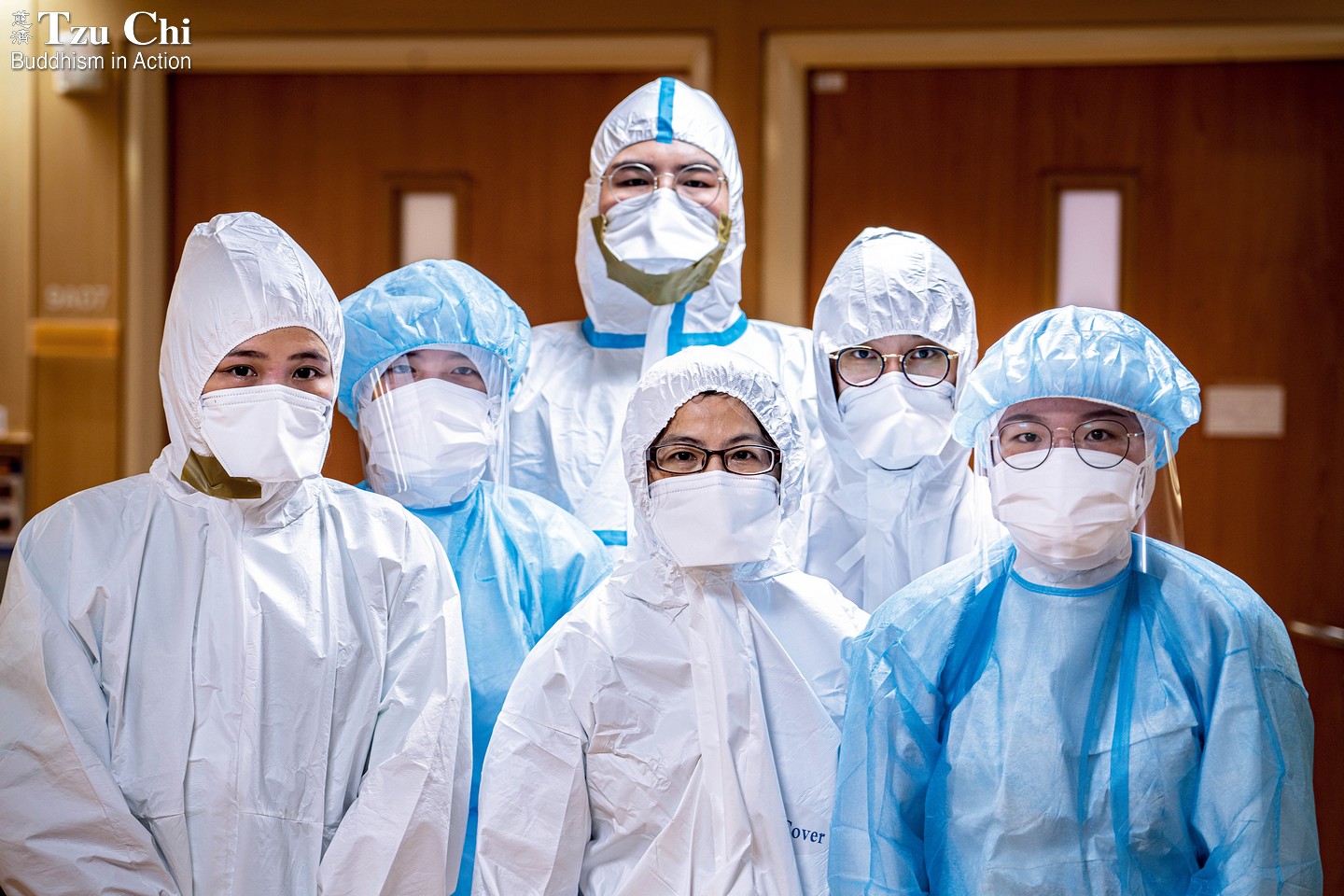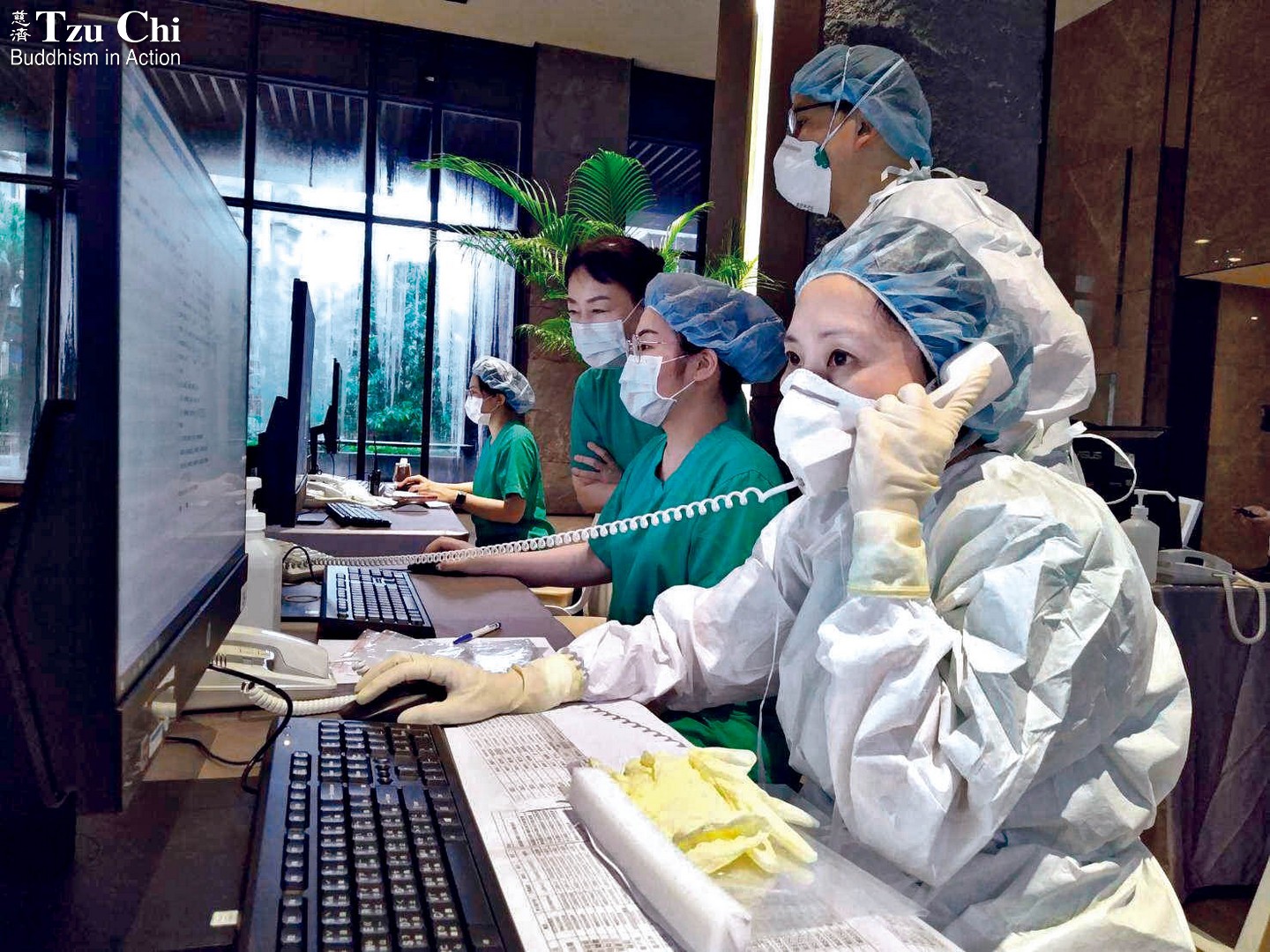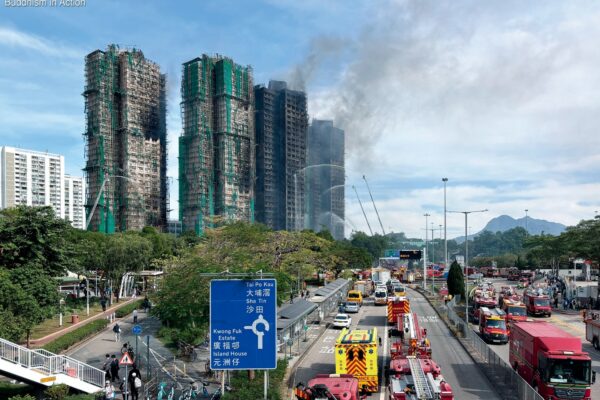By Zhang Yu-fan
Edited and translated by Wu Hsiao-ting
Photos by Hsiao Yiu-hwa
Taiwan faced its most severe challenge posed by the coronavirus in May 2021. Though largely spared from the global pandemic previously, the island saw its total number of cases spike from fewer than 1,500 to more than 10,000 in less than three weeks, from May 15 to June 3. The new cases were largely concentrated in Taipei and New Taipei City, severely testing the capacity of the two cities’ healthcare systems. Taipei Tzu Chi Hospital rose to the crisis by expanding wards to make room for more COVID-19 patients. They were determined to help Taiwan ride out this viral crisis. They ended up being one of the hospitals in Taiwan taking in the most patients.

Healthcare providers in a COVID care unit at Taipei Tzu Chi Hospital
Riding Out the COVID Wave
Medical workers at Taipei Tzu Chi Hospital hurry a coronavirus patient to a COVID care ward. When COVID cases began to climb sharply in Taiwan in mid-May 2021, hospital administrators met the crisis by creating more dedicated space for patients.
It’s Everyone’s Business to Ward Off the Virus
Taipei Tzu Chi Hospital assumed responsibility for an enhanced quarantine hotel at the end of May 2021. Medical staff was posted there for over 50 days to serve asymptomatic or mildly ill patients (left). Administrative workers at Taipei Tzu Chi Hospital helped in the fight against the coronavirus by regularly sterilizing public areas and making face shields to ensure there was a steady supply (below).
One More Person Saved, One More Happy Family
By Zhang Yu-fan
Translated by Wu Hsiao-ting
Photo courtesy of Taipei Tzu Chi Hospital
COVID cases in Taiwan jumped dramatically in mid-May 2021. Within a week,Taipei Tzu Chi Hospital converted five more areas in the hospital into COVID careunits, acting on the belief that each person saved results in one more happy family.
The hospital also assumed responsibility for an enhanced quarantine hotel for patients with mild or no symptoms, set up a community screening station near the hospital’s entrance, and helped staff five vaccine stations at Tzu Chi Jing Si Halls.
In early 2020, when Taiwan had reported fewer than 40 coronavirus cases, Taipei Tzu Chi Hospital unwittingly admitted five COVID patients. As a precaution, 70 medical workers at the hospital who had been exposed to the patients were forced into isolation. Fortunately, no one ended up being infected, but the scare helped raise the hospital’s vigilance against the threat of COVID-19. Realizing the need to better equip itself against the infection, the hospital completed a positive-negative pressure operating room in March 2021. This enabled it to better serve infected patients who needed surgery and at the same time offer better protection to health workers involved in the surgery. On May 27, not long after the facility was completed, an expectant mother diagnosed with the coronavirus underwent Caesarean surgery there.
When the pandemic flared up in Taiwan in mid-May 2021, Taipei Tzu Chi Hospital quickly converted five more areas in the hospital into COVID care wards and reduced its non-emergency medical services to serve more COVID patients. Among the wards was an intensive care unit. The number of diagnosed cases surged from fewer than 1,500 to more than 5,000 in about a week, with more and more middle-aged and older people with multiple chronic illnesses falling victim to the infection. Because such patients were more likely to become seriously ill and require ventilators, Taipei Tzu Chi Hospital created a second intensive care unit devoted solely to COVID patients.
Many front-line medical workers, dedicated to taking care of COVID patients during the crisis, applied for dormitory space at the hospital to avoid taking the virus home. They kept in touch with and soothed their longings for their loved ones with video chats. Everyone avoided going out and about as much as possible. Those who worked in the emergency department and the COVID care units had to endure the discomfort of COVID swabs every week, but they willingly bore the tests.
Severely ill COVID patients could lose their ability to take care of themselves in an extremely short time. Brave and caring nurses were invaluable in such cases. They turned patients over in bed, tube-fed them, and even washed their heads and bodies to keep them clean. They also set up video chats for such patients so that they could meet their family members online. He Pei-rou (何佩柔), a head nurse, said that most patients in her COVID-19 care unit were middle-aged or older. Many weren’t savvy technology users, and since their family members weren’t allowed to come into the ward, she and her fellow workers provided support and company for them. With COVID keeping family members away, medical workers at Taipei Tzu Chi Hospital filled the roles of surrogate family members, treating patients like family.
When hospital isolation wards in Taipei and New Taipei City began to reach their limit, the Taiwanese government decided to place coronavirus patients with mild or no symptoms in quarantine hotels called “enhanced centralized quarantine stations.” Taipei Tzu Chi Hospital took charge of one such hotel on May 31. They set up a temporary medical station and a command center in the hotel’s lobby and started posting medical staff there 24 hours a day. Nearly 70 healthcare providers served on a rotational basis at the hotel for more than 50 days. Of the on-site medical professionals, Dr. Chen Jia-hui (陳家輝), of general surgery, alone put in 216 hours. By the time the last patient left on July 22, they had served 594 people.
Healthcare workers on duty at the hotel video-chatted with patients twice a day to check on their condition. Patients had to regularly measure their own blood oxygen level, heart rate, and body temperature and report the numbers back to the medical workers on duty. When decreased blood oxygen levels, quickened heartbeat, or other medical issues were detected, patients were either rushed to Taipei Tzu Chi Hospital for treatment or provided with oxygen to ensure their safety.

Health professionals from Taipei Tzu Chi Hospital staff a temporary medical station at an enhanced quarantine hotel.
Nurse Guo Huai-en (郭懷恩) works at the psychiatric ward at Taipei Tzu Chi Hospital. Though she volunteered to serve at the enhanced quarantine hotel, she felt the pressure of being near people diagnosed with the infection. To ease that stress, she told herself to focus on what she needed to do at each moment. Her approach worked well: she never once regretted serving there, and was very happy whenever she saw a resident leave quarantine to go home. “The happy smiles on their faces touched me beyond measure,” said the nurse.
Cheng Ching-feng (鄭敬楓), deputy superintendent of Taipei Tzu Chi Hospital, coordinated triage at the hotel. He shared an anecdote about a child patient there. He said that Dr. Chao You-chen (趙有誠), the hospital’s superintendent, went to the hotel every day to extend care to the patients there and cheer them on via a public address system. When a child patient returned home after being released from quarantine, he told his family that a man had talked to him every day from the wall during his stay at the hotel. Everyone who heard this anecdote couldn’t help but smile. “Aside from being amusing, the story also reveals an especially heart-warming side of our service at the quarantine hotel,” said Cheng.
Superintendent Chao said that it was inevitable that hotel employees felt anxious when they learned that their hotel was serving COVID patients. He tried to alleviate their anxiety by assuring them, “We’ll treat you all like family!” Medical workers provided training for hotel employees and on-site police officers to help them better protect themselves against the coronavirus. Healthcare workers also gave these employees and police officers COVID shots and collected samples from them to be tested for the infection. The efforts and precautions were worth the time and energy, ensuring the safety and health of everyone serving at the hotel.



